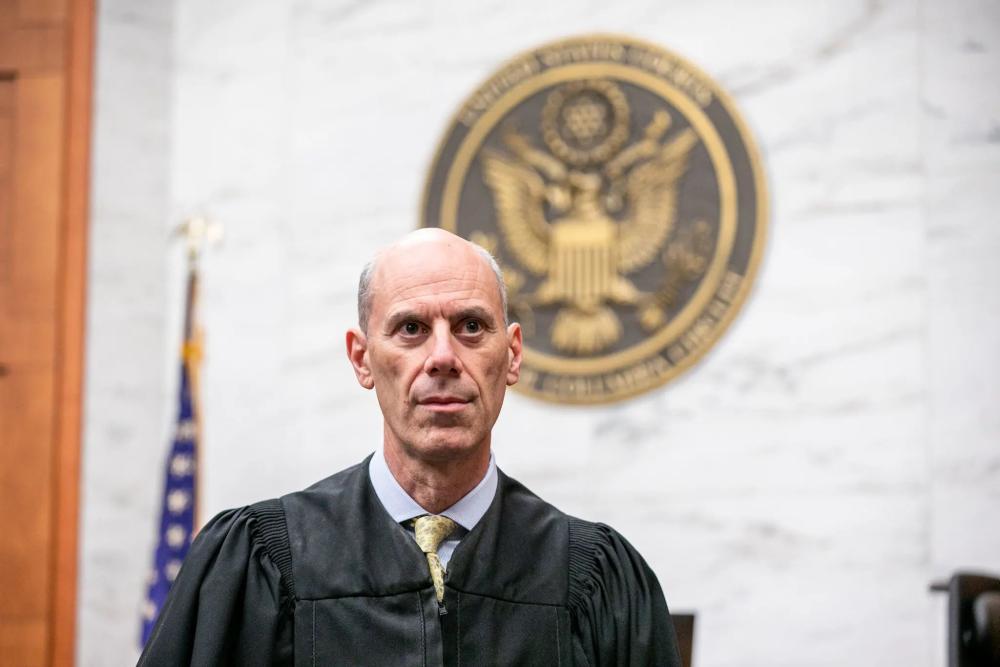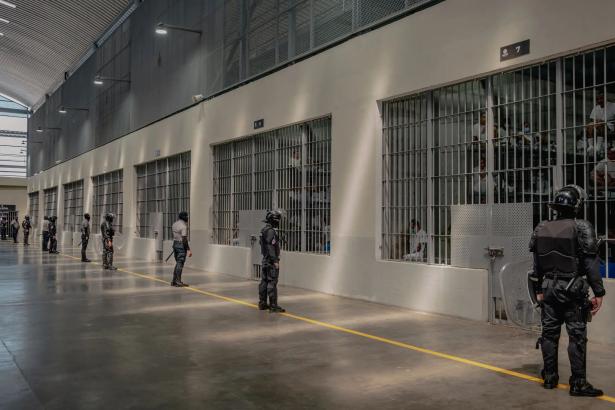For the past several months, the Trump administration has insisted in court that it has no control over the nearly 140 Venezuelan immigrants it deported to a prison in El Salvador this spring under the powers of a rarely used wartime statute.
Both in filings and at hearings, Trump officials have asserted that because the men are being held by jailers in El Salvador, the Salvadoran government has control over their fate. The administration has repeatedly made that claim to argue that it has no real authority to bring the immigrants back itself.
On Monday, however, lawyers for the Venezuelan men produced a document indicating that the government of El Salvador recently told the United Nations that it, in fact, bears no legal responsibility for the men. The document, written in response to a U.N. inquiry examining some of the deportations, also claimed that the Salvadoran government was merely doing the United States’ bidding when it accepted the men into its prison system.
“The actions of the state of El Salvador have been limited to the implementation of a bilateral cooperation mechanism with another state, through which it has facilitated the use of the Salvadoran prison infrastructure for the custody of persons detained within the scope of the justice system and law enforcement of that other state,” the document said.
“In this context,” it went on, “the jurisdiction and legal responsibility for these persons lie exclusively with the competent foreign authorities, by virtue of international agreements signed and in accordance with the principles of sovereignty and international cooperation in criminal matters.”

Judge James E. Boasberg has ordered the Trump administration to take steps to provide due process to the Venezuelan men who were deported to El Salvador in March. Valerie Plesch/Bloomberg
The document was included in a new court filing submitted to Judge James E. Boasberg, who has been hearing a long-running legal case brought by the Venezuelan men in Federal District Court in Washington. As part of that case, Judge Boasberg ordered the Trump administration last month to take steps toward providing the men with the due process they were denied when the White House deported them to El Salvador under the expansive powers of the wartime law, known as the Alien Enemies Act.
The document could present a problem for the administration because it seems to undermine a position that lawyers for the Justice Department and top Trump officials have taken time and again in front of Judge Boasberg. The lawyers for the Venezuelans also claimed that department lawyers knew about the document for months but failed to inform either them or the judge.
“We are pleased that El Salvador publicly told the truth about what we all knew: that it’s the United States that controls the fate of the Venezuelans,” said Lee Gelernt, a lawyer for the American Civil Liberties Union, which, along with another legal group, Democracy Forward, has been representing the men. “That the United States did not provide us or the court with this information is extraordinary."
Skye Perryman, the president and chief executive of Democracy Forward, added, “The documents filed with the court today show that the administration has not been honest with the court or the American people.”
A Justice Department spokesman did not immediately respond to an email seeking comment.
The underlying agreement between the Trump administration and the government of President Nayib Bukele of El Salvador first began to attract attention after the White House deported scores of Venezuelans accused of being members of the street gang Tren de Aragua to El Salvador on March 15.
An investigation by The New York Times recently found that the U.S. government not only paid Mr. Bukele's administration millions of dollars as part of the deal, but also added an extra sweetener at his request: the return to El Salvador of top leaders in a different street gang, MS-13, some of whom had knowledge of his corrupt relations with the group.
The case in front of Judge Boasberg is just one of the many legal skirmishes between the A.C.L.U. and the Trump administration over President Trump’s use of the Alien Enemies Act. Shortly after he returned to office, Mr. Trump issued a proclamation invoking the act to deport Venezuelans accused of being members of Tren de Aragua, which he has designated as a foreign terrorist organization.
Federal courts around the country have been divided on the issue of whether he has properly used the law, which was first passed in 1798 and is meant to be employed only in times of declared war or during an invasion by a hostile foreign nation.
Last week, a federal appeals court in New Orleans held its own hearing about the president’s proclamation in a case that is likely to be the first to end up at the Supreme Court. The justices have already decided that the White House failed to give immigrants ample opportunity to challenge their removals under the act. But they have yet to rule on whether Mr. Trump’s claims that the presence of Tren de Aragua in the United States is tantamount to an invasion and that its members have been acting at the behest of a hostile Venezuelan government comport with reality.
When Judge Boasberg ordered the administration to work toward giving due process to the Venezuelan men even though they remain locked up at the so-called Terrorism Confinement Center, or CECOT, his instructions came in a sweeping — and at times outraged — ruling that compared them to characters in a Kafka novel.
The judge asserted that the White House had effectively stripped the men of their rights by not allowing them to contest their deportations before they were flown into the custody of Salvadoran jailers. But he did not weigh in on the larger question of whether Mr. Trump had invoked the Alien Enemies Act lawfully when he expelled the men to El Salvador.
Judge Boasberg also grappled in his ruling with the critical issue of who had control over the men at CECOT — Mr. Bukele’s government, which received them at the prison, or the United States government, which sent them there.
While the judge acknowledged that it was “a close question,” he eventually determined that “the United States and El Salvador have struck a diplomatic bargain vis-à-vis the detainees” and that he could not second-guess the Trump administration’s assertions that the Salvadorans were in charge.
Still, Judge Boasberg expressed a measure of skepticism, pointing out that several top Trump officials had publicly stated that the administration was deeply involved in the plans to hold the men at the terrorism center.
It remains unclear what effect, if any, the new document could have on Judge Boasberg’s decision, which was temporarily put on hold last month by the federal appeals court that sits over him.
The lawyers for the Venezuelans said they wanted to reserve the right to ask the government for additional discovery information about the deal the administration had struck with El Salvador, given that the new document seemed to go beyond “the current record” in the case in front of Judge Boasberg.
The lawyers said that such additional information was important because the new material contradicted a sworn declaration filed in May by Michael G. Kozak, a senior State Department diplomat.
“It was and remains my understanding that the detention and ultimate disposition of those detained in CECOT and other Salvadoran detention facilities,” Mr. Kozak said in the declaration, “are matters within the legal authority of El Salvador in accordance with its domestic and international legal obligations.”
Alan Feuer covers extremism and political violence for The Times, focusing on the criminal cases involving the Jan. 6 attack on the Capitol and against former President Donald J. Trump.


Spread the word